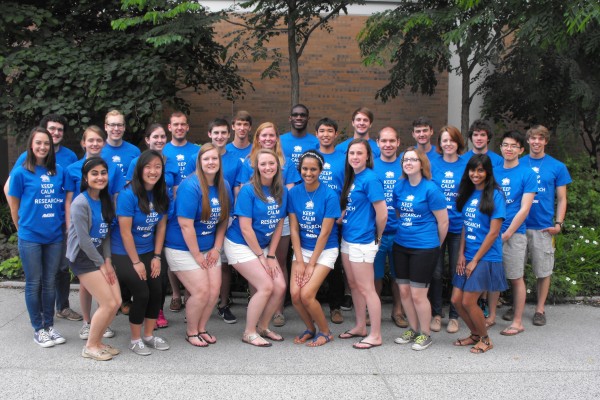Jeff Boyer in ‘Bubble Trouble’ Nov. 22
A bubble volcano? A bubble roller coaster? A bubble cannon and bubble trumpet? In “Bubble Trouble,” Jeff Boyer takes bubble art and bubble science to illogical extremes — sculpting, juggling and building with the most ephemeral, effervescent material imaginable.
Blasingame honored by Association of Fundraising Professionals
One of Washington University’s own received special acknowledgement from the St. Louis Chapter of the Association of Fundraising Professionals. In a ceremony held Nov. 13, David Blasingame, executive vice chancellor for Alumni & Development Programs, was given the association’s Lifetime Achievement Award for his dedication and long-running success.
Errors in single gene may protect against heart disease
Rare mutations that shut down a single gene are linked to lower cholesterol levels and a 50 percent reduction in the risk of heart attack, according to new research led by Nathan Stitziel, MD, PhD, of the School of Medicine. The gene, called NPC1L1, is of interest because it is the target of the drug ezetimibe, often prescribed to lower cholesterol.
Washington University, Children’s Hospital join national network to study causes of preterm birth
Washington University, St. Louis Children’s Hospital and the March of Dimes are launching the March of Dimes Prematurity Research Center at Washington University in St. Louis.
Picture emerges of how kids get head injuries
A study in which more than 43,000 children were evaluated for head trauma offers an unprecedented picture of how children most frequently suffer head injuries, report physicians at Washington University School of Medicine and the University of California, Davis, School of Medicine.
Depression, overwhelming guilt in preschool years linked to brain changes
In school-age children previously diagnosed with depression as preschoolers, a key brain region involved in emotion is smaller than in their peers who were not depressed, scientists at the School of Medicine have shown.
Wash U Expert: Supreme Court case against Affordable Care Act has no merit
The U.S. Supreme Court has agreed to hear a lawsuit targeting federal subsidies designed to help millions of Americans afford health insurance. The case is dubious on its merits, says Timothy D. McBride,
PhD, professor at Washington University in St. Louis’ Brown School and
a noted health economist, citing legal precedent as reason for allowing the subsidies to continue.
Friedman engages Wash U students
Before delivering the keynote address at Washington University in St. Louis’ Founders Day celebration Nov. 8, prolific author and journalist Thomas L. Friedman visited with students on the Danforth Campus. Friedman, the popular columnist for The New York Times known for his sophisticated analysis of complex issues facing the world, engaged students in a lively discussion.
Washington University receives new grant to host Amgen Scholars Program
Washington University in St. Louis has been awarded a grant from the Amgen Foundation that will provide hands-on laboratory experience to undergraduate students through the Amgen Scholars Program. This marks the fifth year that Washington University is participating in the program.
Olin Cup finalists offer innovative solutions, compete for top prize
Ten finalists in the 2014 Olin Cup Competition are offering novel solutions to real-world challenges and will vie for $70,000 in seed money to start a new company. The Olin Cup is sponsored by the Skandalaris Center for Interdisciplinary Innovation and Entrepreneurship at Washington University in St. Louis.
View More Stories

